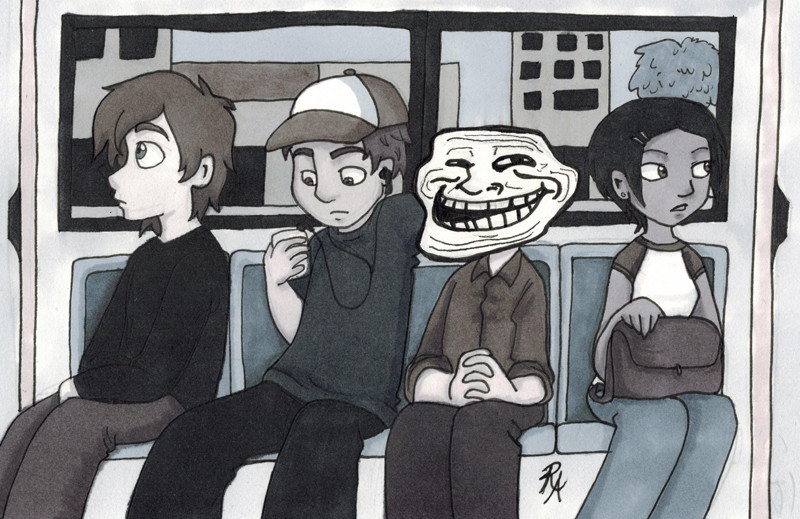Trolls: Not just under bridges anymore
Why do some people behave so differently online?
If you want to experience some of the worst specimens that humanity has to offer, go to almost any YouTube video and scroll down to the comments. In fact, go to any news, blog or video website that allows anonymous feedback and you’ll find them, prowling around like hungry lions.
Trolls used to be a crucial ingredient in fairy tales, a means to frighten or educate youngsters.
Now they are an increasingly unavoidable aspect of the World Wide Web, attacking other’s work or comments in an attempt to draw their victims into an off-topic and often emotional argument.
While this might sound harmless, it’s only the tamest definition of a troll.
Type “troll harassment” into Google and you’ll find any number of much more serious troll incidents. Trolls eliminate the possibility for constructive online discussion of important topics by posting unnecessarily cruel, malicious or hateful material.
The strangest part of the troll phenomenon is that prevalence of online troll behaviour does not seem to coordinate with the same proportion of inappropriate behaviour between groups and individuals in a face-to-face environment.
“The online context is ripe for embellishing facts or saying (inappropriate) things,” says Dr. Jessica Cameron, an associate professor of psychology at the University of Manitoba.
“I think in part it is because people can’t see each other face to face,” she says. “It makes it feel a little less real - the other person is more of an abstract construct and they don’t see immediately what their statements are doing.”
Not only can a troll not see the people they annoy and harass, but their victims also cannot see them, creating a greater sense of anonymity and safety.
“Some people who are high self-monitors tend to match a situation,” Cameron says. “So if they’re in public they are very polite. When that’s the behaviour that they think is expected from them, they’re going to fulfill that role.
“When it feels private to them, or what feels like a private situation, they may not self-monitor as much.”
While the Internet is as public as it gets, people sitting at home on their computers can easily forget their audience.
“Their face is not part of the situation,” Cameron says. “They are removed through the computer screen and that frees people up from taking responsibility for their actions, and it removes inhibitions.”
This is perhaps the most troubling part about trolls. If the screen disconnect eliminates inhibitions, is the way trolls behave online their most sincere personality?
Cameron says it is always difficult to talk about what constitutes a “true self,” but she has several theories when it comes to trolls.
“ Some people actually take pleasure from hurting others. But that’s not the norm, especially to hurt a stranger. For the most part, people are not that wicked.
Dr. Jessica Cameron, associate professor of psychology, University of Manitoba
“I think in part when people act like trolls, they are victims of a situation,” she says. “The situation is pulling for anonymous behaviour; you don’t have to take responsibility and you’re removed from the actual consequence. All that makes it more likely.”
“Sometimes there’s an expectation to be harsh,” she says. “When people bully others or post really mean and hateful things, they get a reaction. The behaviour is motivated by rewards from others for being cruel.”
In other words, combine an anonymous position with a ready audience and an online culture that sometimes encourages maliciousness, and some people are bound to turn trollish.
“But of course not everybody does that, not everybody falls into that trap,” Cameron says.
A second group uses the online forum or comments board to stabilize their inflated sense of self-worth.
“Narcissistic people can’t feel empathy as much and tend to use people more,” Cameron says. “They tend to say, ‘I’m great, I’m great, everybody loves me.’ And part of that process might be pushing other people down.”
Defensive high self-esteem individuals who have a fragile grasp on their false self-security are more likely to lash out if they feel themselves threatened, Cameron says - an effect that is probably only magnified by the anonymous environment.
Cameron also suspects that a third and much smaller group of online trolls are neither victims of circumstance nor narcissists, but somewhere closer to what many people would call evil.
“Some people actually take pleasure from hurting others,” Cameron says. “But that’s not the norm, especially to hurt a stranger. For the most part, people are not that wicked.”
While it seems the potential motivations for being an asshole to strangers online are many, Cameron says that the best course of action for most victims of trolling is complete non-engagement, thus denying trolls that which they most desire: anger.
“To make somebody feel something, to get that kind of powerful reactions from somebody bestows a lot of power on you,” she says. “People enjoy that kind of power.”
Published in Volume 66, Number 25 of The Uniter (March 28, 2012)








